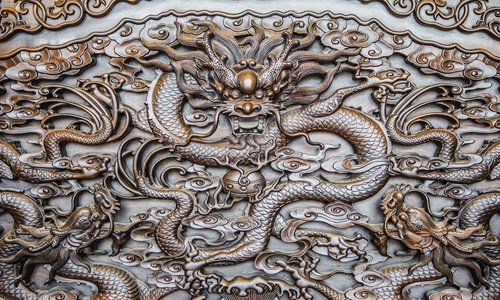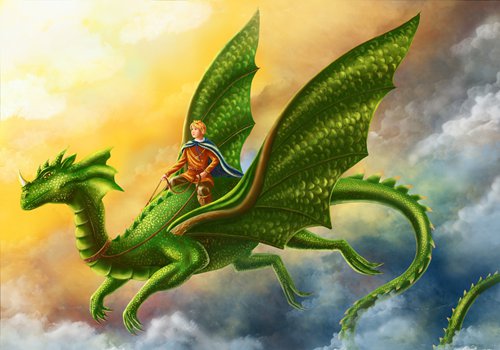Chinese scholars debate alternative English translation 'loong' for China’s ‘dragon’
By Chen Xi Source:Global Times Published: 2019/8/18 17:13:39

A wood carving of a Chinese dragon Photo: VCG

A painting of a Western dragon Photo: VCG
For centuries, China's iconic mythological creature long has been translated as "dragon" in English. However, long in China is actually quite different from dragons in the West. In China, long is usually seen as an amiable and auspicious animal while dragons in the West are usually depicted as dangerous monsters like the dragon from the Old English epic Beowulf or high fantasy novel The Lord of the Rings.
For this reason, some scholars have proposed using 'loong' in English when talking about the Chinese dragon.
"The Chinese word long should be transliterated as 'loong' to distinguish the creature from the vile image of dragons in the West," Huang Ji, a teacher at the East China Normal University's School of Communication, told the Global Times.
However, many Chinese experts are opposed to the proposal, calling it an unnecessary change that would deteriorate China's cultural confidence and lead to more misunderstandings among foreigners.
"People in other countries who know even just a little about Chinese culture can distinguish the difference between the Chinese dragon and Western dragon. It is totally unnecessary to change it into the strange word 'loong,'" Huang Youyi, former vice president of the China International Publishing Group and executive vice president of the Translators Association of China, told the Global Times.
Changing meaning
The 2010 version of the Oxford Dictionary of English says "dragon is a mythical monster like a giant reptile. In European tradition the dragon is typically fire-breathing and tends to symbolize chaos or evil, whereas in East Asia it is usually a beneficent symbol of fertility associated with water and the heavens."
Although the authoritative English dictionary includes an explanation about the creatures depiction in Asian culture, Huang Ji said that a different translation is still needed.
"The dictionary only records how the word is used at this stage, but it cannot prove that the usage is correct," Huang Ji said.
"Foreign missionaries in China mistranslated long into 'dragon' 200 years ago, and the English dictionary has to continue explaining the situation since we Chinese have not corrected the mistranslation. If we separate 'loong' from 'dragon,' the English dictionary will be modified."
However, Zhu Yuan, an editorial writer in the Opinion Department of China Daily, told the Global Times that he did not agree with the idea of using transliteration instead of translating.
"'Dragon' has been used for a long time in translation and has gradually been accepted by Western people. If we change it into another word, the word's meaning will become unstable, which will cause communication barriers between people around the world," Zhu said.
He explained that word usage is something that should change naturally instead of being dictated by people.
"The semantics of a word change during the use of a language. For example, the 2010 version of Oxford Dictionary of English has added the Chinese dragon's kind image into the word 'dragon,' which shows that the word's meaning has changed naturally. Those who want to use the transliteration 'loong' have a distorted understanding of language as they see words as dead things that cannot be changed," he said.
Far-reaching impact
According to Huang Ji, the importance of using the right word will have an impact that goes far beyond the field of translation. It involves China's national image and avoiding diplomatic incidents.
"The Chinese claim to be 'the descendants of the dragon,' which might give those who are not friendly to China the opportunity to besmirch China's image," he noted.
"Long is just a folk symbol. It is unreasonable to say its translation is connected to the nation's future. Even if the translation of long is changed, those who are not friendly to China will still make some other excuse to target China," Wang Pingxing, a specialist at the Xinhua News Agency's Foreign News Department, told the Global Times.
Understanding culture
Many words besides "dragon" have different or even the opposite meaning in China and the West due to the two sides' historical, sociological and political differences, so translators need to find ways to translate from one language to another without distorting the original meaning, Wang noted.
"Transliteration has been widely used for many words in either language like cola, kung fu, jiaozi, tofu and the like, but these words usually need to be annotated to provide a more detailed explanation," Huang Ji said.
"There are many different ways to approach translation. I can't say which is the best, all that matters is that it achieves good results when it comes to communication," Zhu said, noting that finding a word in English that has a similar meaning to a Chinese word is easier to understand than transliteration of a foreign word.
"The translation of long has been discussed for years, and I think it is useless to continue it. It will be better if we transfer our energy in helping foreign people better understand Chinese culture," Huang Youyi told the Global Times.
Newspaper headline: Lost in translation
Posted in: MISCELLANY,CULTURE & LEISURE